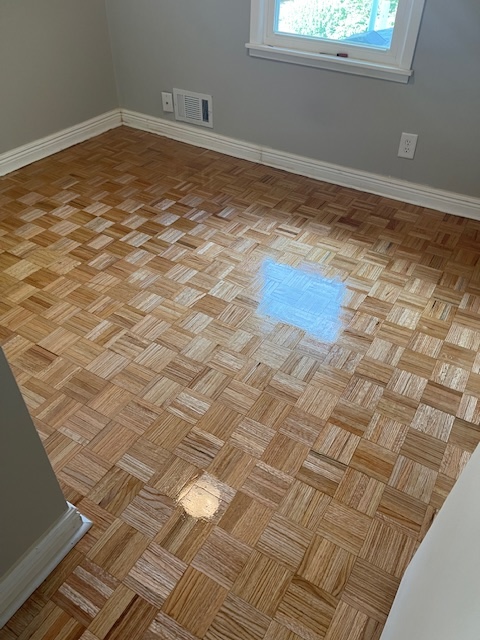Water based or oil based polyurethane for floor finish?

When it comes to finishing hardwood floors, polyurethane is one of the most popular choices. It provides a durable, protective layer that enhances the natural beauty of the wood. However, there are two main types of polyurethane finishes: water-based and oil-based. Both options offer a high level of protection, but they come with distinct characteristics that can influence your decision. In this post, we’ll break down the differences between water-based and oil-based poly, discussing their advantages, drawbacks, and how to choose the right one for your home.
Durability: Nearly Equal in Modern Finishes
One of the most common concerns people have when choosing between water-based and oil-based polyurethane is durability. In the past, oil-based poly was considered the gold standard for long-lasting protection, thanks to its thick, hard finish. However, modern advancements in water-based polyurethanes have narrowed the gap significantly.
Durability-wise, both water-based and oil-based polyurethanes now perform exceptionally well, even in high-traffic areas. Oil-based finishes have historically been known for their superior wear resistance, but the difference is less pronounced with today’s high-quality water-based formulas. In fact, water-based poly products now come with advanced hardeners, which can enhance their durability even further. Some water-based options even offer a two-part system that includes a hardener, which bonds with the finish for added strength and long-term resilience.
While the durability of both finishes is comparable today, it’s worth noting that water-based finishes typically dry quicker and have a faster curing time, which can be an advantage if you’re looking to get your floors back into use sooner. Additionally, water-based finishes are often easier to apply and clean up, making them a more user-friendly option.
Odor and Drying Time: Water-Based Takes the Lead
When it comes to odor and drying time, water-based polyurethane finishes are the clear winner. Oil-based finishes have a strong, lingering odor due to the solvents used in their formulation. This smell can be overpowering, especially in poorly ventilated spaces, and it can last for several days after the application. For people sensitive to strong smells, this can be a significant drawback.
In contrast, water-based polyurethanes have minimal odor and are much more pleasant to work with, especially in indoor spaces. They dry much faster as well—usually within 2 to 4 hours—which means you can apply multiple coats in a single day. This faster drying time is ideal for homeowners who need a quicker turnaround. Oil-based poly, on the other hand, can take anywhere from 6 to 8 hours between coats and may require up to 24 hours to fully cure, delaying the project and the ability to walk on your floors.
Color and Appearance: The Amber Effect of Oil-Based Poly
Another difference between the two types of polyurethane is the color change over time. Oil-based polyurethane has a natural tendency to amber or yellow slightly as it ages. This can actually enhance the richness of darker woods, giving them a warm, golden hue. However, this ambering effect may not be desirable for light-colored woods like maple or ash, where the yellow tint may detract from the floor’s natural look.
Water-based polyurethanes, on the other hand, remain clear and do not change color over time. This makes them a great choice for lighter woods, as they preserve the wood’s natural tone without adding any unwanted warmth. If you’re looking for a finish that will stay true to the wood’s original color, water-based poly is the best option.
However, there’s a workaround for those who like the golden tint of oil-based poly but still prefer the benefits of water-based options: some water-based products offer an option to add a “whitener” or “yellowing reducer”. This additive helps give the floor a slightly warmer hue, mimicking the look of oil-based finishes without sacrificing the clarity and long-term stability that water-based poly provides.
Long-Lasting Durability with Water-Based Additives
Water-based polyurethanes are continually evolving, and modern formulations are often enhanced with advanced additives. One such additive is the two-part hardener system, which can make the finish even more durable than traditional water-based products. This system typically consists of a hardener that is mixed with the polyurethane before application. Once combined, the two components bond and cure to form a stronger, more durable finish that rivals even the best oil-based options. This added durability makes water-based polyurethanes an excellent choice for high-traffic areas and homes with pets or children.
Which Should You Choose?
Both water-based and oil-based polyurethane finishes have their advantages, and the decision often comes down to personal preference and specific project needs.
-
Go for water-based polyurethane if:
- You need a quick drying time and minimal odor.
- You’re working with lighter woods and want to preserve their natural color.
- You prefer a low-maintenance, eco-friendly option with easy clean-up.
- You want to take advantage of modern, durable water-based formulas with hardeners or whiteners for added longevity.
-
Choose oil-based polyurethane if:
- You like the rich, ambering effect that develops over time, especially on darker woods.
- You don’t mind the stronger odor and longer drying time.
- You’re refinishing floors that have been previously treated with oil-based finishes and want to maintain a consistent look.
In the end, the choice between water-based and oil-based polyurethane largely depends on your priorities, whether that’s faster application, durability, or the visual appearance of your floors. Both options are durable, reliable, and provide excellent protection for your hardwood floors.

